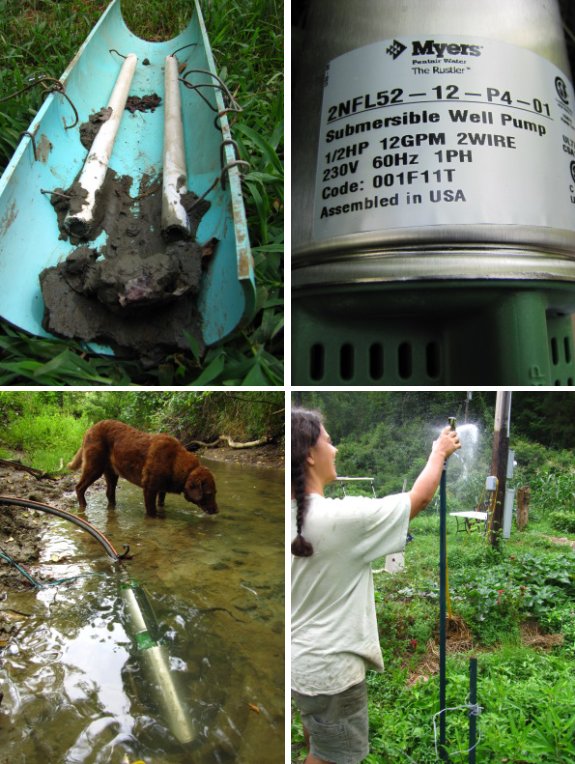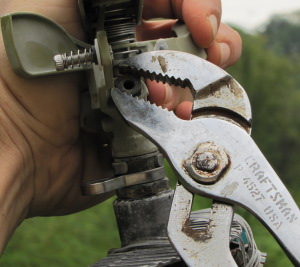
Lessons learned from irrigation pump replacement adventure

We figured out the problem
was not with the wiring. I'm still glad we upgraded
to the 12 gauge wire,
which might help our new pump last longer.
The PVC
pipe I cut in half to hold the pump turned out to be a mistake. It
was allowing clay to accumulate next to the motor, which might have
been causing it to overheat and then to shut down. We deleted that
"improvement" today.
 Another mistake might have been
upgrading the power from 1/2 horsepower to 3/4. We decided to take back
the 3/4 horsepower pump to Lowes and order a 1/2 horsepower pump from
our local hardware store. The new pump is made by Myers, and the step
down in power cost more than the Lowes 3/4 pump by about 50 dollars,
which I feel fine about. I'm confident our local guy is not gouging us
on the price and think that this may be a higher quality device.
Another mistake might have been
upgrading the power from 1/2 horsepower to 3/4. We decided to take back
the 3/4 horsepower pump to Lowes and order a 1/2 horsepower pump from
our local hardware store. The new pump is made by Myers, and the step
down in power cost more than the Lowes 3/4 pump by about 50 dollars,
which I feel fine about. I'm confident our local guy is not gouging us
on the price and think that this may be a higher quality device.
It sure is nice to not have a
garden full of thirsty vegetables.
Want more in-depth information? Browse through our books.
Or explore more posts by date or by subject.
About us: Anna Hess and Mark Hamilton spent over a decade living self-sufficiently in the mountains of Virginia before moving north to start over from scratch in the foothills of Ohio. They've experimented with permaculture, no-till gardening, trailersteading, home-based microbusinesses and much more, writing about their adventures in both blogs and books.
Want to be notified when new comments are posted on this page? Click on the RSS button after you add a comment to subscribe to the comment feed, or simply check the box beside "email replies to me" while writing your comment.

Dave V --- The creek is a good distance away and downhill from our garden, which means we had to pay attention to pressure to ensure we still had some when the water got to where it was going. After some research, we discovered that submersible pumps give you more pressure in that situation, and the sump pump types just aren't powerful enough to get water up our hill. (Sump pumps would really have been more appropriate, though, if we could have used them, since they're made to handle the bit of debris that inevitably ends up in the creek.)
A non-submersible pump that sucks water rather than pushing water generally only operates if you don't have much vertical distance to cover. So, your first step should be to measure both the vertical and horizontal distance you want to move water, then use those numbers as you're researching your pump. Good luck!